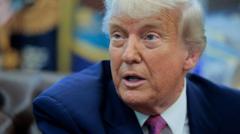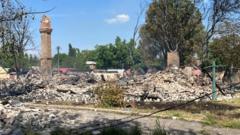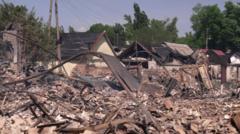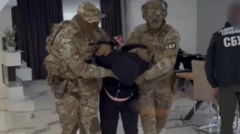Germany's fresh approach under Chancellor Friedrich Merz looks to bolster Ukraine's defense capabilities against Russian aggression.
German Chancellor Pledges Support for Ukraine's Long-Range Missile Production
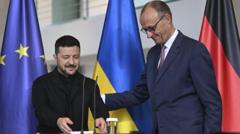
German Chancellor Pledges Support for Ukraine's Long-Range Missile Production
In a significant shift in military support, Germany vows to assist Ukraine in manufacturing long-range missiles.
Germany's newly appointed Chancellor, Friedrich Merz, has made headlines by announcing his commitment to assist Ukraine in producing long-range missile systems necessary for countering Russian military actions. During a press conference alongside Ukraine's President Volodymyr Zelensky in Berlin, Merz stated, "We want to talk about production," reaffirming that while specifics wouldn't be discussed publicly, a "memorandum of understanding" regarding long-range missile collaboration would be signed between the defense ministers of the two nations the same day.
Taking office earlier this month, Merz promised to enhance Germany's support for Ukraine, asserting that there are now "no longer" any limitations on the range of weapons provided by Ukraine's Western allies. The focus appears to be on the Taurus missile—capable of striking within a 500 km (310 miles) radius—and capable of hitting deeper into Russian territory compared to existing far-range missile systems.
Despite not explicitly mentioning the Taurus, the Chancellor highlighted the significant change in Germany's military policy, marking a break from the more cautious approach of his predecessor, Olaf Scholz. Merz's announcement was met with warnings from the Kremlin, which described lifting range restrictions on Ukraine's missiles as a perilous escalation that could undermine the potential for a political resolution to the ongoing conflict. Nevertheless, Merz emphasized that the decision to remove such limitations had been a collaborative choice among Western allies made months prior.
During the press conference, Merz reiterated Germany's steadfast support for Ukraine, cautioning Moscow that its refusal to engage in peace negotiations would bear "real consequences." Zelensky, advocating for a three-way dialogue to address the war's resolution, expressed openness to various negotiation formats.
This comes in the wake of recent discussions between Russia and Ukraine, where limited progress was made, resulting primarily in a prisoner exchange due to the low level of talks. Yet Russian Foreign Minister Sergei Lavrov indicated that Moscow is prepared for a second round of peace discussions with Ukraine. He suggested that the next round could transpire on June 2 in Istanbul, emphasizing a desire for all involved in peace efforts to endorse this dialogue actively.
Ukraine has criticized Russia for slowing the peace process, demanding a quick delivery of confirmed peace terms outlined in previous discussions. Zelensky has also urged the U.S. to intensify sanctions against Russian banking and energy sectors, with President Biden indicating his administration's willingness to act if Russia fails to comply with peace efforts.
The ongoing hostilities have escalated in recent days, with Ukraine reporting large-scale drone strikes on Russian positions and a significant military buildup by Russian forces along the northeastern front, prompting Ukrainian defense officials to alert the public to the increased dangers posed by this troop concentration. The conflict, now entering its fourth year, has devastated wide regions of Ukraine and claimed countless lives, with Moscow currently occupying roughly 20 percent of the country, including Crimea, annexed in 2014.







